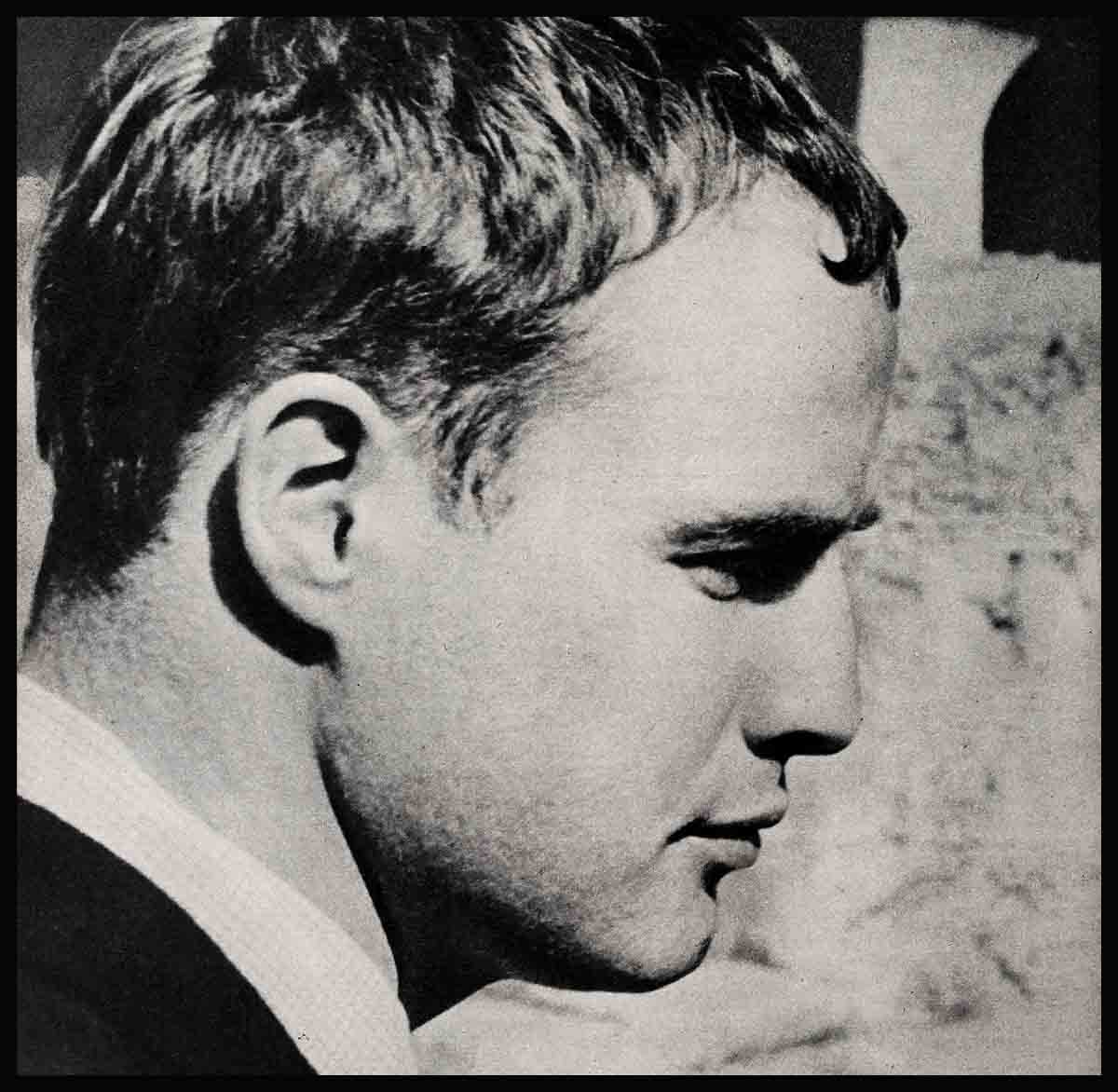
Pursuit Of Happiness—Marlon Brando
The road of a genius is often strewn with brickbats and bordered with bouquets. The bouquets have no roots and soon their sweet odor passes and their blooms fade. The brickbats, expertly hurled, often find their mark and the sting lingers long after the surface black and blue bruises show no more. That Marlon Brando is trudging this road at the moment, there is little doubt. And that he will keep on this road is foreordained, whether or not in mere mortal existence, he’s married to his Josane Mariani.
Marlon Brando is a genius—but a genius who is a product of his times. (Others before him have not only left their mark, but have been marked by their own era.) Marlon gripes because the public is interested in his love for Josane, yet he couldn’t have chosen a more quietly spectacular way of revealing that love. Marlon gripes because people are interested in what he eats for dinner (steaks mostly), gripes because people note he once wore sweat shirts (striped) and blue jeans (always clean). Yet, on the other hand, when he wants to correct the impression that he is not still aping the teenager’s costume and show that he dresses like everyone else, he buys a Homburg (and who wears Homburgs?).
Brando reminds one of the old stories told about another acting genius, John Barrymore, who frequently carried a champagne glass in one hand and, perched on his shoulder, a monkey that as frequently bit people. Did Barrymore do this because he had an eccentric liking for impolite monkeys or because he wanted something around that could bite when he couldn’t? Barrymore in his day was a serious actor who became as wildly eccentric as the torrid twenties demanded. Brando, another serious actor, is perhaps simply carrying out the eccentricities that only a genius would have a genius for in 1955.
Right at the moment Marlon is working hard at learning his routines for “Guys and Dolls” and you can bet your bottom dollar that he’ll be as good in this as he was in “On the Waterfront” and “Désirée”—for whatever else is said about Brando, no one has yet accused him of not being serious about his work. Serious? Rather, he’s dedicated!
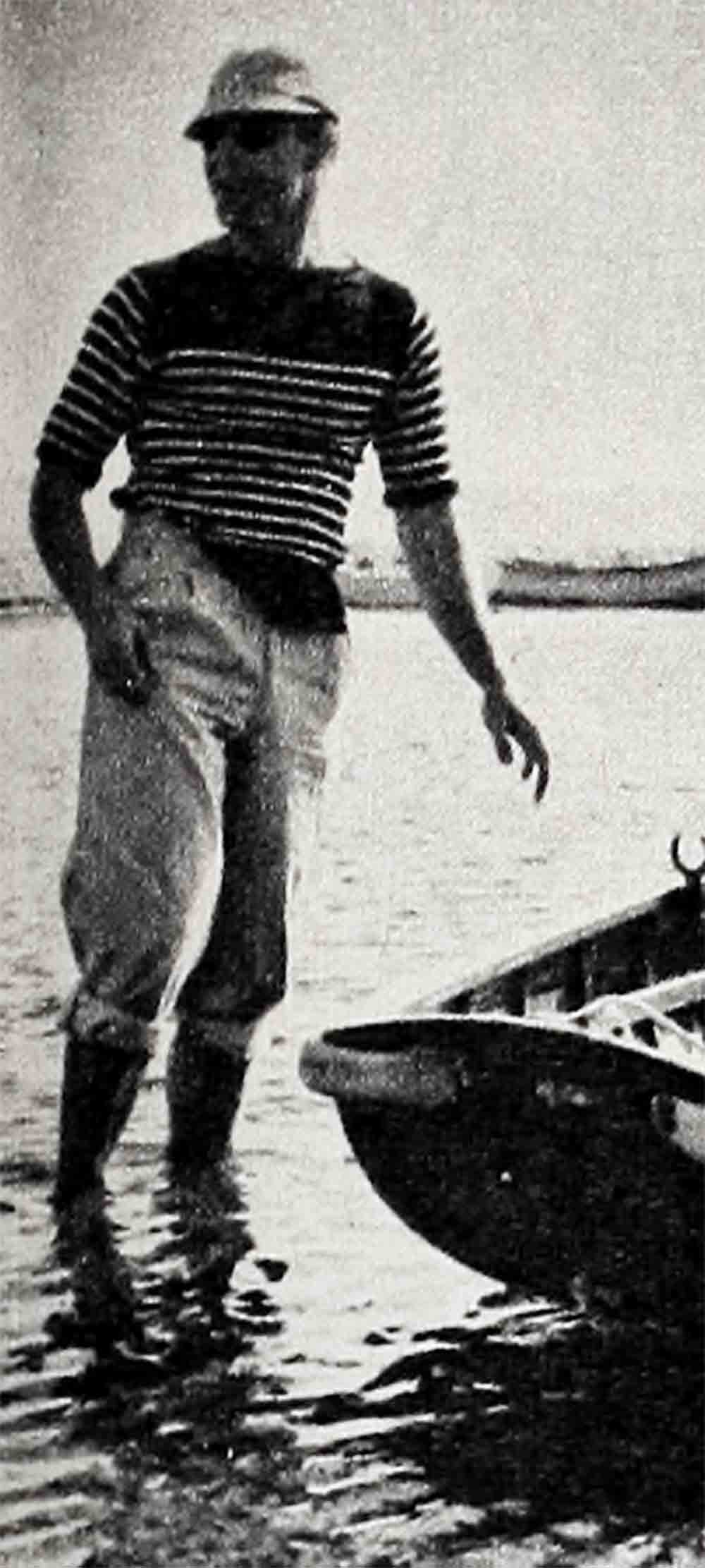
Whether or not Josane is the girl to share that dedication, to take a back seat to Marlon’s career, only time can tell. Josane, for all her youthful nineteen years, is ambitious. And as Marlon said, “She has a lot of growing up to do yet. Jumping right into this thing (marriage) wouldn’t be fair to her.” Fair or not, Josane wanted an immediate trip to the altar and wedding plans proceeded immediately. So far, she has been able to avail herself of television offers that have come about as a result of her romantic attachment with Brando. All hats will have to be doffed to little Josane if she makes a go of marriage for love.
For genius husbands have mentally and emotionally disturbed more mature women than Josane. A taste of what is in store for her, as long as Brando is a popular performer, came wayback last October.
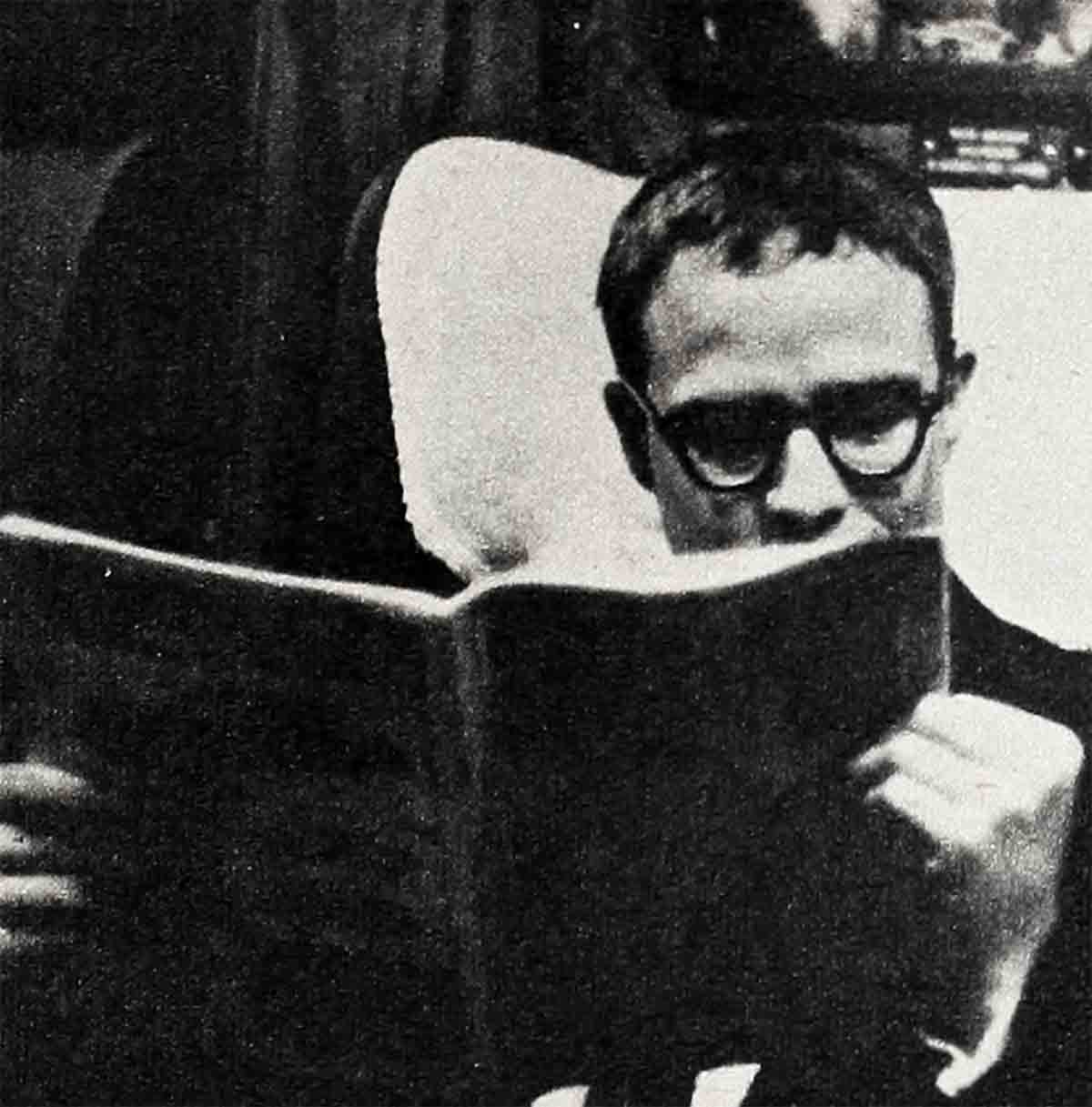
Brando had arrived in Paris last October after a trip aboard the Ile de France. In Paris he found refuge with his friend Herve Mille, Director of Paris Match, a French magazine. Josane came up to join him from Bandol, where she had been staying with her parents since July. She had gone directly to Bandol from Hollywood where she had been a frequent visitor on the set of “Désirée.” In Paris, Marlon took her to various restaurants and even told newspaper friends they were engaged. Typically, his newspaper friends did not take him seriously for they remembered another incident of his “engagement” to Denise Darcel. Brando even went so far as to have his “engagement” photograph made with Josane. While he managed to avoid all but his closest friends among the newspaper people, he told everyone he was going to the French Riviera to get away from newspapermen and get a rest. Sending Josane back to her parents in Bandol, Marlon did just that.
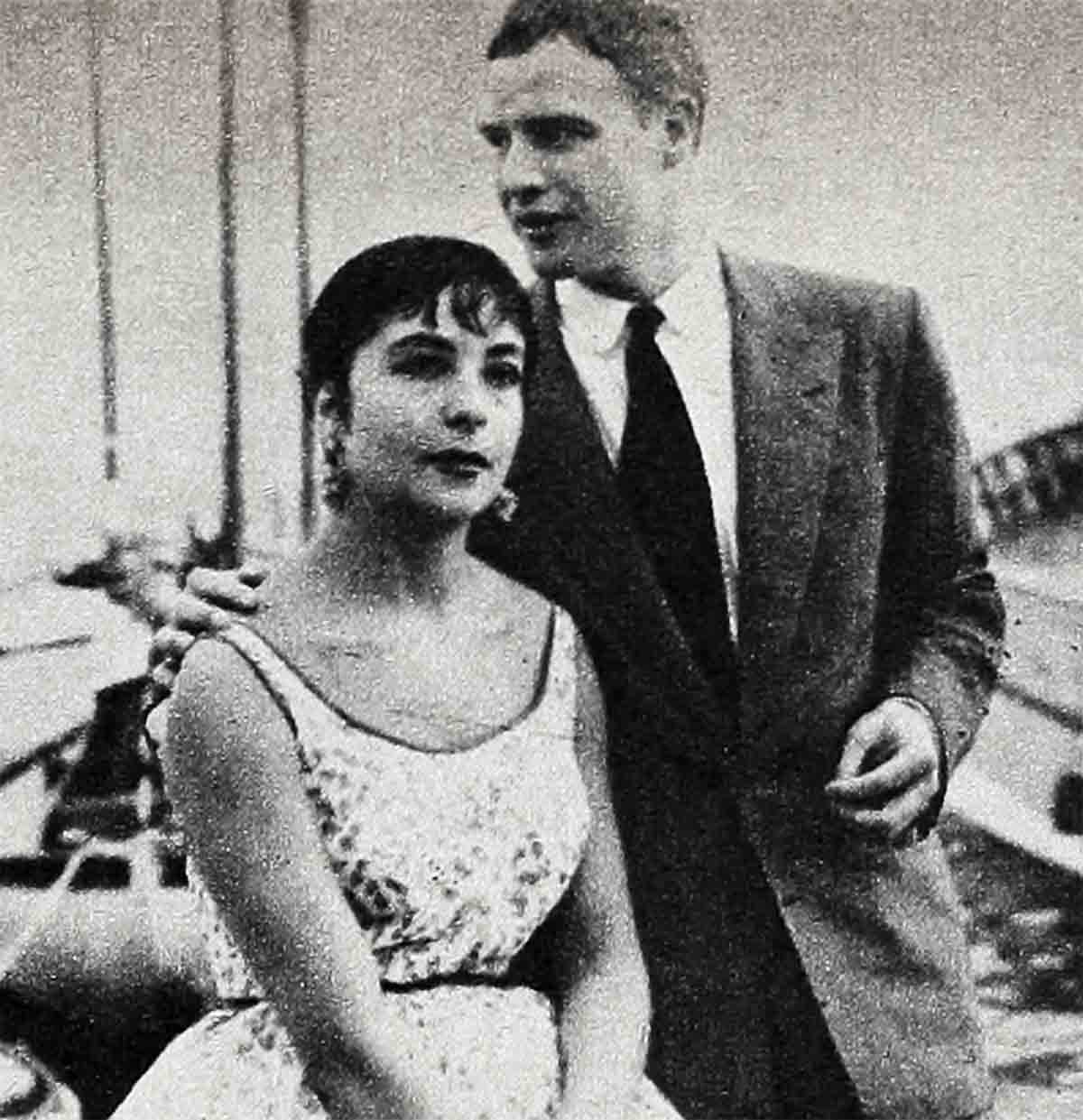
In Nice, Brando was interviewed by the press with shaving cream on his face and when he was asked where he was going, he told the truth. “I’m going to Bandol, then Rome, then Paris and then back to New York. Next year I must make two films here, one in France and one in Italy. I cannot at this time give you any details, but you will surely see me again in your beautiful country. This is my fourth trip here, and I am beginning to feel at home in France. Your Frenchwomen manage to be the most attractive in the world, without having to buy clothes at the big dressmakers. An American is impressed by seeing them on the street. How chic and well-dressed they are even though they don’t have much money—they have excellent taste.” Incidentally, Brando speaks excellent French and when conversing ‘with newsmen speaks in their language. When speaking with Josane, he speaks partly in French, partly in English.
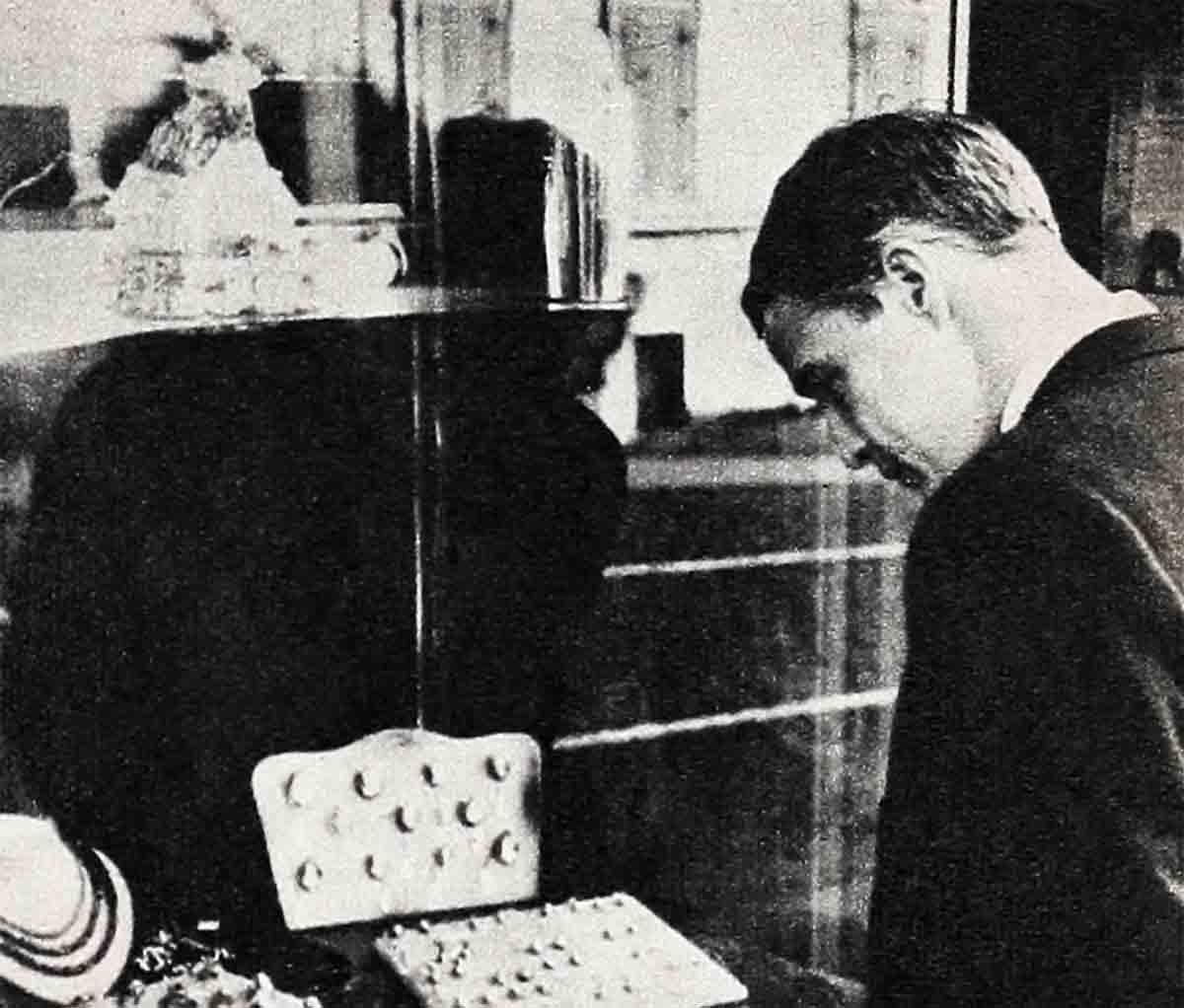
From the moment Brando reached Bandol until he returned to his home at the Carnegie Hall apartments in New York City, his love affair with Josane was carried on in the public eye. After taking the train from Nice, Marlon arrived at Toulon from which he had to take a bus to Bandol. There he found a taxi which took him to Henri’s, a small bar, over which there is an apartment in which Josane Mariani’s mother and stepfather live. Josane’s mother had married Paul Bérenger, a local fisherman, after she was widowed during Josane’s childhood.
As Brando alighted from the taxi, he called “Hello, Baby” and Josane ran to meet him. And as they embraced each other, all Josane’s girl friends came from neighboring houses and the introductions began. This was the American actor about whom Josane had written from the United States and about whom she had talked repeatedly since her return home.
In their modest three-room apartment, the Bérengers had prepared for the arrival of this great star. New chintz curtains were put up, the Provencal furniture polished and shined. A couch was prepared for Marlon to sleep on in the dining room. Marlon planned to stay just two and a half days and it was during this two-day stay that the Bérengers inserted into the local papers the now-famous sentence—“Mons. and Madame Bérenger are pleased to announce the engagement of their daughter Josane to Mons. Marlon Brando.”
If Marlon had deliberately designed a more spectacular way of disturbing his own peace, he couldn’t have done a better job—he had exploded his own personal atomic bomb. By noon the next day, literally hundreds of photographers and reporters arrived in Bandol, one even flew there from London in his newspaper’s special plane.
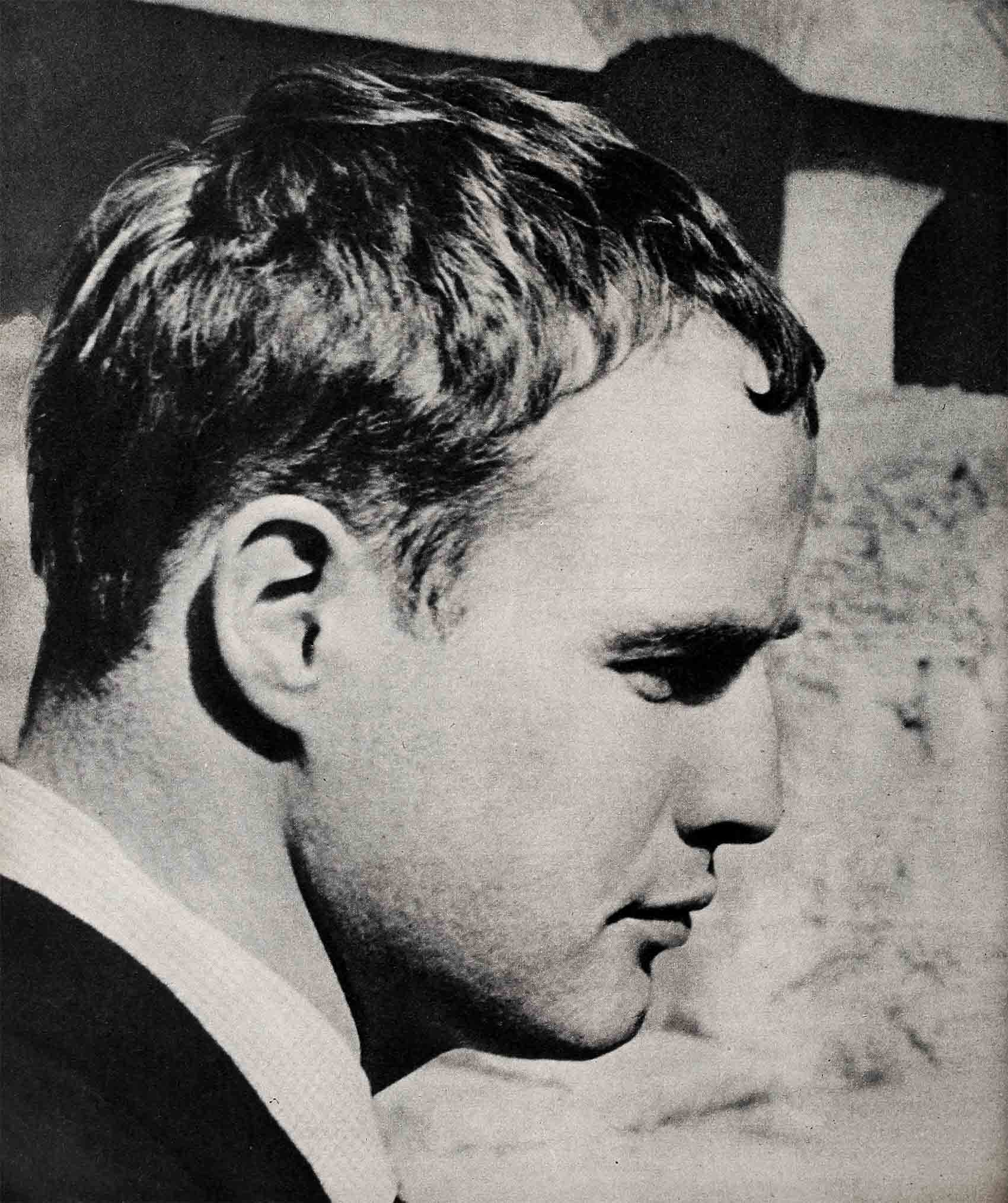
It was then that the whole story of Josane Mariani’s background came out and Brando’s love for her was revealed. Josane was a model for the late Kisling, one of France’s famous artists, whose wife discovered Josane and was struck by her youthful beauty. Madame Kisling convinced Josane’s mother that Josane should pose for her husband. After several months of working for the artist and his wife, she allowed Kisling to paint the two famous nudes over which there was so much newspaper comment. Through the Kislings, Josane met a New York psychiatrist and his wife (not the one Brando has had sessions with) and came to New York as tutor for their children. Here, through Kisling’s influence, she got a tiny part in a Jose Ferrer New York stage play. Meanwhile, Josane had enrolled in a dramatic school and it was through one of their parties that she met Marlon.
Naturally, because of the large part that the late Kisling played in Josane’s life, it was at Madame Kisling’s villa that Josane and Brando had their first meal in Bandol (Madame Kisling’s villa has now been turned into a restaurant). Incidentally, it was here during Josane and Marlon’s separation that Marlon was able to reach Josane by telephone from the United States. Josane would go to the villa at appointed hours and there await his telephone calls.
Josane has the words which Marlon cannot (or will not) say about his particular pursuit of happiness. “Marlon is tired of big hotels and of all the publicity around him. I was hoping my country would give him the peace and quiet he seeks. My parents live very simply from the profits of my stepfather’s fishing. That’s all. We’re happy. I believe, as does Marlon, that happiness lies in simplicity.
“Why do they say that Marlon is eccentric? Just because he doesn’t like newspaper people to ask him personal questions. That’s why this legend of eccentricity has been built around him! For example, here he wore a knitted sailor’s shirt. What’s so extraordinary about that? He rented a scooter. Millions of people rent scooters. It’s fun. What’s wrong with that? He is a boy with simple tastes, that’s all. It’s nobody’s business whether he writes me often or not, or whether he phones me or not. I want everyone to know that those who believe that Marlon is like the person he played in ‘Streetcar Named Desire,’ it is not true. He is a good steady boy and ours is a pure story, deformed by his world fame.”
Perhaps Josane’s picture of Brando is more accurate than she realizes—the picture of a genius in our times who must somehow or other get back to the simple things. For the thirty-year-old Brando, perhaps his release from genius lies not in the champagne of the twenties, but in sailor shirts and scooters. Perhaps with Josane, such a simple life can be his.
THE END
It is a quote. PHOTOPLAY MAGAZINE MARCH 1955




